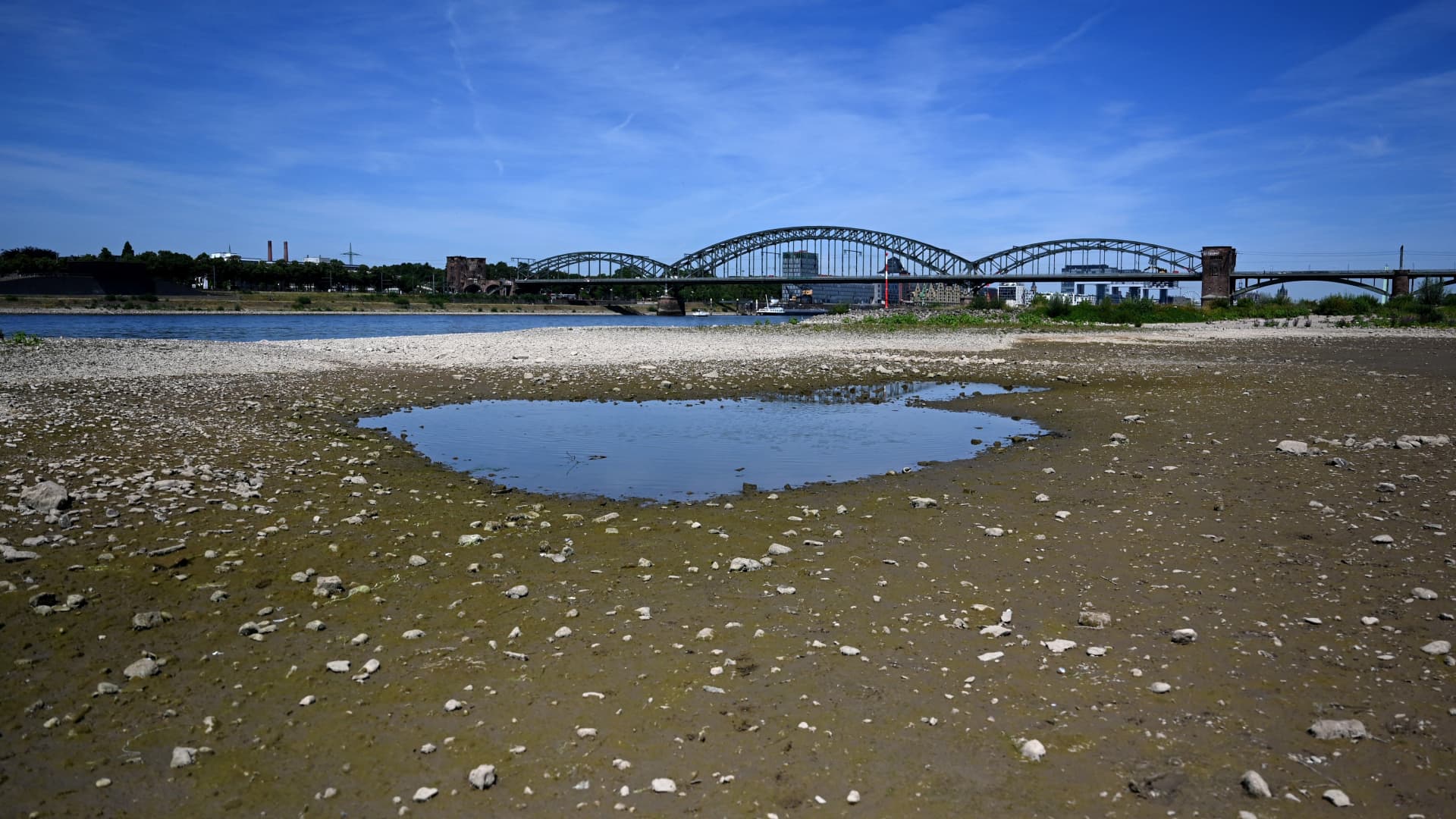
The water levels in a crucial waterway in Europe’s economic heartland are running dangerously low in the searing heat the region has been experiencing, posing a big risk to the German economy and more disruption to supply chains which are already under stress.
“Amid a long spell of dry weather, water levels of the River Rhine have fallen far below average this summer,” Salomon Fiedler, an economist at Berenberg Bank, said in a note Wednesday in which he warned that the German economy was “running aground.”
“The Rhine is a crucial inland waterway, on which goods are shipped to and from the industrial heartlands of southern and western Germany,” he said, adding that “low water levels mean that river barges will have to travel with reduced freight to limit their draft or even cease operating altogether.”
As a result, the amount of goods being shipped will decline while freight rates will rise, he said, adding that “experience from past low-water periods suggests that it is very difficult in the short term to switch from river shipping to road or rail.” Furthermore, low water levels can also affect production in industrial and power plants that rely on river water for cooling, he noted.
The River Rhine is one of the European continent’s most important shipping routes and is certainly Germany’s most important waterway, with around 80% of inland waterway goods transport relying on this one river that passes through major cities and ports like Cologne, Dusseldorf, Rotterdam and Basel.
It is particularly important for transporting agricultural products, commodities like coal and oil, and chemicals production and in previous years Germany’s manufacturing sector has come under extreme pressure when water levels on the river run low.
One particular gauge of the river’s water levels at a measuring station in Kaub has just fallen below an officially defined benchmark for navigation, Fiedler noted.
“The measuring station at Kaub sits at a crucial bottleneck where the fairway is especially shallow. On Sunday, the water level at the Kaub gauge fell below the 78cm ‘equivalent water level’, an officially defined benchmark for navigation, and according to the Federal Institute for Hydrology’s most recent six-week forecast, water levels are likely to decline further in the coming weeks and stay below that benchmark for the foreseeable future,” he said.
Water levels at Kaub — seen as a key chokepoint for water-borne freight — have dropped throughout the week and stood at 71cm on Wednesday, data fromGermany’s Federal Waterways and Shipping Administration showed. A normal water level would be around the 200cm mark.
Rhine-induced recession?
Low water levels on the Rhine come at a very difficult time for Germany’s economy with analysts fearing it could be sliding toward a recession as it contends with a high-inflation low-growth environment, supply chain bottlenecks and pressures brought about by the war in Ukraine, particularly in terms of energy.
In the first quarter of 2022, the economy grew just 0.2% from the previous quarter, meaning it narrowly avoided a technical recession given a contraction in the previous quarter, while the inflation rate stood at 7.6% in June, weighing on domestic demand. A flash purchasing managers’ index data for June also showed a darkening mood for Germany’s manufacturing sector and more economic woes on the horizon.
Experience of low water levels has taught us what extra negative impact these can have on the economy too; 2018 was the most recent dry year for the Rhine, with water levels reduced to just 30cm in places, making it unnavigable for larger cargo barges.
This prompted many producers to resort to using other means of transport or to use smaller or partially-loaded barges, all of which pushed freight costs up for producers. Some manufacturers were even forced to halt production, increasing costs and disrupting supply chains.
Analysis has been done by the Kiel Institute to measure the economic impact of low water levels with the research showing that in a month in which water levels are below the 78cm threshold every day, German industrial production is around 1% lower than in a month with no low-water days.
In its 2020 analysis the institute stated that “low water levels lead to transportation disruptions that cause a significant and economically meaningful decrease of economic activity” but there are concerns that the economic impact could be worse this time, with supply chains already disrupted following the Covid-19 pandemic, the war in Ukraine already threatening Germany’s energy supplies and the increased use of larger barges (with deeper drafts) on the river.
“On the one hand, Germany is most likely sliding into a recession already. This would suggest that industrial production and the need for shipping would be lower anyway, reducing the sting of low water levels,” Fiedler said, but there are notable differences to previous water-borne crises.
“Supply chains were already under heavy stress and inventories depleted after two years of pandemic-related disruption. The ability of firms to absorb delays in transportation is probably more limited than normal,” he noted.
The fallout from Russia’s unprovoked invasion of Ukraine has added to global supply problems – especially in the commodities markets. Given that around a third of Germany’s domestic shipping of coal, crude oil and natural gas runs on rivers and canals, its waterways are crucial as Germany scrambles to replace Russian pipeline gas with coal to generate energy, Fiedler said.
Robert Lehmann, an economist at Germany’s influential Ifo Institute research center, told CNBC that low water levels might in fact be one of the more more manageable problems Germany faces right now.
“The low water level puts further pressure on industrial production which is currently without much momentum due to the supply bottlenecks in intermediate goods,” he told CNBC on Wednesday.
“However, [the] shipment of goods across Germany is much more under pressure because of the walkout at the Port of Hamburg. As both things occur simultaneously, the effects of the low water levels might be mitigated. Overall, the effects should be manageable compared to the other, much more striking influences [on the economy]” such as inflation or supply bottlenecks, he said.




